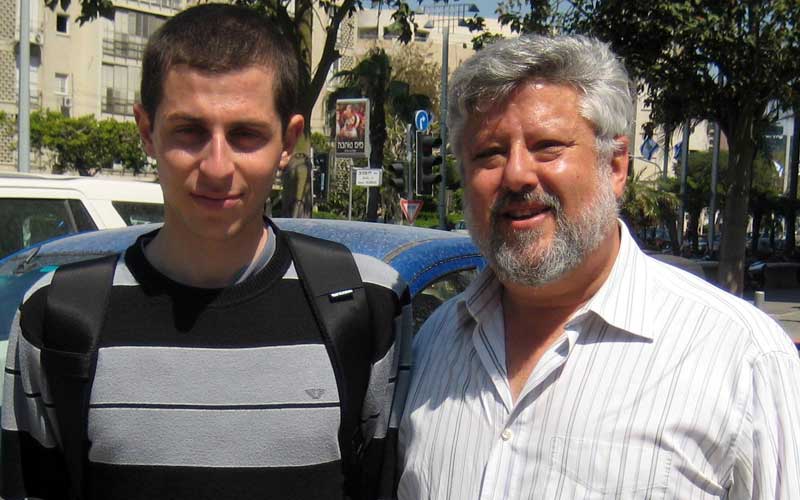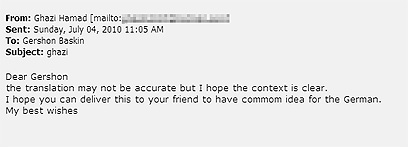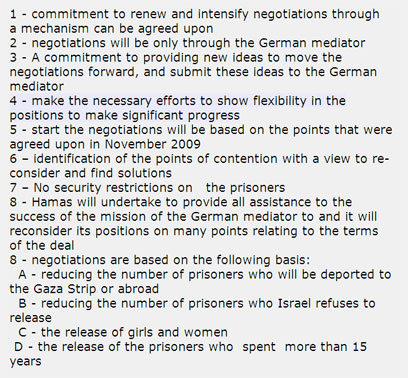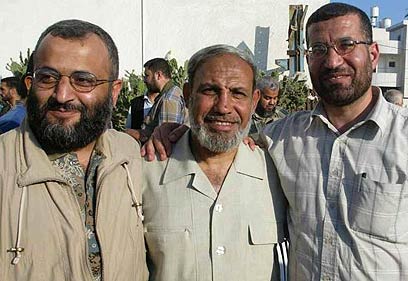New details concerning prisoner exchange reveal Hamas was willing to compromise over a year prior to Shalit’s release, but unofficial initiative to that effect was dismissed by government
Codename – “Phoenix”: In the end of 2009, a little over three years after IDF soldier Gilad Shalit was abducted by Hamas, Israel’s negotiations for his release hit an all-time low.
German mediator Gerhard Conrad arrived in the Gaza Strip that December and met with Ahmed Jabari, head of the Izz al-Din al-Qassam Brigades, who was holding Shalit, and presented him with his draft for a prisoner exchange deal.
Conrad must have imagined that Hamas would have some reservations about the deal, but it is doubtful he could have expected the reaction that followed.
According to Palestinian sources, Jabari glanced at the 150-page document’s abstract and flew into a rage, screaming that Conrad has lost his neutrality and is clearly favoring Israel.
Jabari’s reaction stemmed from the fact that the extensive document was complex and written in a legal jargon neither he nor others in Hamas’ military wing could understand.
Jabari, being a field operative believed – at the time at least – that a prisoner exchange deal should be drafted in a simple language and stretch to no more than a few pages, including the addendum detailing the prisoners included in the deal.
Jabari promptly banished Conrad from the Gaza Strip and also fired top Politburo delegate in Gaza Mahmoud al-Zahar, who was his liaison to the German mediator.
The day would result in the longest stalemate in the negotiations to retrieve the abducted solider.
Direct line of communication
In the first week following Shalit’s kidnapping, an unofficial line of communication was established by Gershon Baskin, director of the Israel-Palestine Center for Research and Information (IPCRI) and Co-CEO Hanna Siniora vis-à-vis Razi Hamed, who served as Hamas’ government deputy Foreign Minister.
Hamed had asked Baskin to put him in touch with Noam Shalit, a mere six days after his son was taken, and assured him that Gilad was alive and was treated according to Islam’s laws regarding prisoners of war, i.e. – that he was provided with shelter, food and medical care.
Hamed and Baskin maintained their communications throughout Shalit’s time in captivity, mostly via emails and phone calls. The two had also met twice, in Gaza.
This line of communications, however, was initially disregarded by those tasked with negotiating Shalit’s release.
Baskin said that government envoys Ofer Dekel and Hagai Hadas dismissed his attempts to explain that it could be used as a path to safely retrieve Shalit; but he refused to give up and maintained contact with Hamed even in the months when Israel and Hamas held no indirect negotiations as all.
Turning point
On July 4, 2010, after months of deadlock, Baskin received a surprising document from Hamed. The latter, who at that time served as the official in charge of the Gaza crossings, had daily contact with Jabari who apparently had signed off on the offer detailed in it.
The new offer suggested reinstating Conrad as well as indicated that Hamas was willing to compromise its demands just enough to reignite the negotiations.
This is the document, as it was sent to Baskin, via email:
Baskin promptly forwarded the document to Hagai Hadas, who again refused to cooperate, saying that there could be only one channel of communications between Israel and Hamas.
Baskin, undeterred, contacted Conrad, who said that if Jabari had indeed agreed to the content – he needed to send it to him directly.
Baskin then contacted Hamed with Conrad’s response. Hamed relayed the massage, but Jabari’s answer was dispiriting: No.
Jabari refused on the grounds that initiating any contact with the German mediator would be humiliating for Hamas. He did, however, indicate that he was willing to agree to a joint appeal by Conrad to both parties.
According to Baskin The following weeks saw much ego-play over who would call who first. In an effort to circumvent the situation, he forwarded Hamed’s document to Prime Minister Benjamin Netanyahu’s Military Secretary Yohanan Locker, but received no response.
He then sent a letter to Defense Minister Ehud Barak, pleading with him to take the offer seriously, since it represented the first sign in months that Hamas was willing to negotiate.
“Hamas is willing to contact Conrad but won’t do so if they are the only ones, because they believe it would weaken their position and they don’t believe Israel is willing to compromise,” Baskin wrote Hamed.
“According to Razi Hamed, Hamas will contact Conrad if Israel does the same… I’ve given Hagai Hadas the document, but I know he won’t take it seriously. This is why I’m seeking your direct intervention, so we can get these negotiations back on track.”
A laconic reply soon followed: “Dear Dr. Baskin… Your letter has been forwarded to the professional body handling all aspects of the matter. Generally speaking, Israel is pursuing this deal (with Egypt’s aegis) vis-à-vis the German mediation only.”
Soon after that, Baskin visited Berlin and sought a meeting with Conrad in an effort to explain to him that there was a real opportunity to promote the stalled negotiations.
At this point, however, he found that Conrad too was shunning him. Baskin believes that Hadas was behind that decision.
Seized opportunity
That all changed in mid 2011. In April of last year, Hagai Hadas stepped down and was replaced by David Meidan. After learning of the existence of the Baskin-Hamed channel, Meidan promptly obtained official permission to pursue it, as long as it remained clandestine.
Baskin’s operation was given an official government codename – “Phoenix.”
Soon after that, Baskin and Hamed began formulating what would later be used as the basis for the deal. The draft was changed seven times before it finally met Netanyahu’s approval.
After the deal was finalized and Gilad Shalit was safely back in Israel, Baskin met with Meidan and showed him the document he was given by Hamed in 2010. Meidan said he knew nothing of the document, or the opportunity it entailed.
The Prime Minister’s Office declined to comment on the matter, as did the Defense Ministry.
Gershon Baskin memoirs and more revelations about the Shalit deal will be included in a book titled “Codename – Phoenix,” which will be published in early 2013.
Originally Published in YNet Magazine






